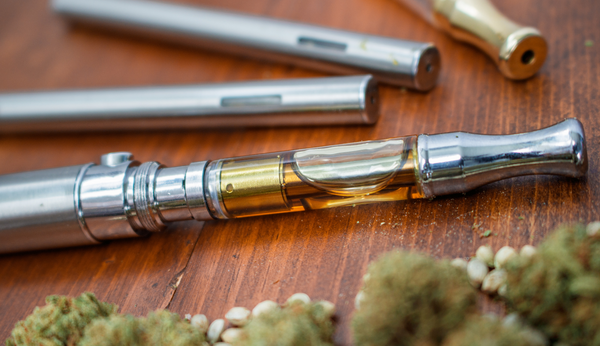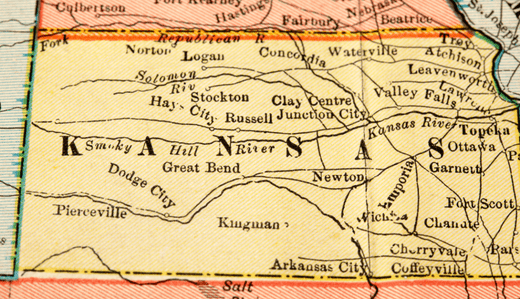Your Cart is Empty
FREE SHIPPING ON ALL ORDERS $75+
Although Delta-8-THC has been legalized on a federal scale, some states still have laws in place that prevent access. Is Delta-8-THC legal in Kansas? Or does it suffer the same date as cannabis in the Sunflower State?
Thankfully, yes! Delta-8-THC is legal in Kansas and the state has removed hemp-derived cannabinoids from it's controlled substances list.
Take a look at Kansas Delta-8-THC laws before you buy in the state:
Looking for legal Delta-8-THC you can buy in Kansas? Check out our Elev8 Collection.
Disclaimer: We’re always working to stay informed on the latest Delta-8 laws and research. However, state laws are subject to change and we advise that you do your own research to verify the information you find in this article. This is not intended as legal advice.
Table of Contents
Delta-8-THC and Federal Laws
Kansas Delta-8-THC Laws
Is Delta-8 a Controlled Substance in Kansas?
Delta-8-THC Possession Limits in Kansas
Is Delta-9-THC Legal in Kansas?
Where to Buy Delta-8 in Kansas
Do You Have to Be 21 to Buy Delta-8?
Is Delta-8 Legal in All 50 States?
Resources
Shortly after the passing of the 2017 Farm Bill, Kansas joined many other neighboring states (like Oklahoma, Nebraska, and Missouri) in updating hemp laws to legalize industrial hemp and its derivatives. That means that CBD was officially legal in the state, as well as all other hemp-derived cannabinoids, isomers, and other extracts.
Thankfully, the legislation also included updates to the state's Controlled Substances Act. The amendment clarified that hemp-derived tetrahydrocannabinols are not classified alongside other tetrahydrocannabinols derived from cannabis, which are considered Schedule I Substances in Kansas.
Here are some excerpts from the relevant texts:
New Section 1.
(2) ‘‘Delta-9 tetrahydrocannabinol concentration’’ means the combined percentage of delta-9 tetrahydrocannabinol and its optical isomers, their salts and acids, and salts of their acids, reported as free THC on a dry weight basis, of any part of the plant cannabis sativa L.
(4) ‘‘Hemp products’’ means all products made from industrial hemp, but not limited to, cloth, cordage, fiber, food, fuel, paint, paper, particleboard, plastics, seed, seed meal and seed oil for consumption and certified seed for cultivation, if the seeds originate from industrial hemp varieties.
(5) ‘‘Industrial hemp’’ means all parts and varieties of the plant cannabis sativa L., cultivated or possessed by a state educational institution or the department, whether growing or not, that contain a delta-9 tetrahydrocannabinol concentration of no more than 0.3% on a dry weight basis.
Sec. 4. K.S.A. 2017 Supp. 21-5701 is hereby amended to read as follows: 21-5701.
(j) ‘‘Marijuana’’ means all parts of all varieties of the plant Cannabis whether growing or not, the seeds thereof, the resin extracted from any part of the plant and every compound, manufacture, salt, derivative, mixture or preparation of the plant, its seeds or resin. ‘‘Marijuana’’ does not include:
(1) The mature stalks of the plant, fiber produced from the stalks, oil or cake made from the seeds of the plant, any other compound, manufacture, salt, derivative, mixture or preparation of the mature stalks, except the resin extracted therefrom, fiber, oil or cake or the sterilized seed of the plant which is incapable of germination; or
(2) any substance listed in schedules II through V of the uniform controlled substances act; or
(3) industrial hemp as defined in section 1, and amendments thereto, when cultivated, possessed
Sec. 7. K.S.A. 2017 Supp. 65-4105 is hereby amended to read as follows: 65-4105.
(h) Any of the following cannabinoids, their salts, isomers and salts of isomers, unless specifically excepted, whenever the existence of these salts, isomers and salts of isomers is possible within the specific chemical designation:
(1) Tetrahydrocannabinols……………………………………………………… 7370
Meaning tetrahydrocannabinols naturally contained in a plant of the genus Cannabis (cannabis plant), as well as synthetic equivalents of the substances contained in the plant, or in the resinous extractives of Cannabis, sp. and/or synthetic substances, derivatives, and their isomers with similar chemical structure and pharmacological activity such as the following: Delta 1 cis or trans tetrahydrocannabinol, and their optical isomers Delta 6 cis or trans tetrahydrocannabinol, and their optical isomers Delta 3,4 cis or trans tetrahydrocannabinol, and its optical isomers (Since nomenclature of these substances is not internationally standardized, compounds of these structures, regardless of numerical designation of atomic positions covered.), except tetrahydrocannabinols obtained from industrial hemp as defined in section 1, and amendments thereto, when cultivated, possessed or used for activities authorized by the alternative crop research act.
 Is Delta-8 a Controlled Substance in Kansas?
Is Delta-8 a Controlled Substance in Kansas?Kansas updated their Controlled Substances Act to clarify a difference between cannabis derived tetrahydrocannabinols and those derived from hemp. The following phrase was added to the definition of tetrahydrocannabinols under the list of Schedule I Controlled Substances:
"except tetrahydrocannabinols obtained from industrial hemp as defined in section 1…"
The state defines hemp as Cannabis Sativa material and all derivatives, extracts, cannabinoids, isomers, acids, salts, and salts of isomers with a Delta-9-THC content of no more than 0.3%.
Therefore, Delta-8-THC derived from legal hemp material is not considered a controlled substance in Kansas.
Because Delta-8-THC is classified as a hemp product in Kansas, there are no defined possession limits in place for consumers.
Still, Delta-8 could be easily confused for Delta-9 THC by authorities without proper documentation and lab testing.
Basic lab testing checks only for tetrahydrocannabinol, meaning that extensive lab tests are needed to differentiate between Delta-8 content and Delta-9 content when proof of legal possession is needed.
No. Kansas is one of very few states that has not enacted a medical cannabis program, and recreational use is also legal within the state.

According to state hemp laws, legal hemp products can be sold in the state so long as it is produced in accordance with the state’s hemp plan and contains no Delta-9-THC. That means you’re in luck if you’re looking to buy Delta-8-THC in Kansas.
Still, it’s advisable to proceed with caution when choosing a Delta-8 distributor. While you can likely find various hemp products in local stores, there may be benefits to buying Delta-8 online. One reason is that you can buy directly from a brand or manufacturer, instead of purchasing through a third-party vendor that may not fully understand Delta-8 effects and uses or the laws surrounding Delta-8 products.
At Vida Optima, our Delta-8-THC products comply with all parameters of the Hemp Farming Act of 2018. We can also help answer questions about Delta-8 before you buy, or you can read our “What is Delta-8-THC?” guide to learn everything you need to know.
There are no state regulations that place age restriction on the purchase of hemp-derived products. Retailers have the right to determine age limits for the purchase of Delta-8 products, but many retailers require consumers to be at least 21 years of age.

Delta-8-THC is currently federally legal under the context of the Hemp Farming Act of 2018, but each state has the right to determine their own stance on tetrahydrocannabinols derived from hemp. Delta-8-THC is legal in Kansas according to state law, but you should read more about Delta-8 laws by state to determine the legality in other areas.
Ready to shop for Delta-8 in Kansas? Our Elev8 collection includes edibles, tinctures, vapes, and more that are Farm Bill compliant and legal in the U.S.
Delta-9 THC is legal in Kansas if it is derived from hemp and contains no more than 0.3% Delta-9 THC on a dry weight basis, in accordance with federal law.
Delta-8 and Delta-9 THC are both cannabinoids found in the cannabis plant. The primary difference is their chemical structure and potency. Delta-9 THC is more potent and is the primary psychoactive compound in cannabis, while Delta-8 THC is less potent and produces milder effects.
The Kansas Attorney General has stated that Delta-8 THC is legal under state law as long as it is derived from hemp and contains less than 0.3% Delta-9 THC. This aligns with federal regulations under the 2018 Farm Bill.
Comments will be approved before showing up.



